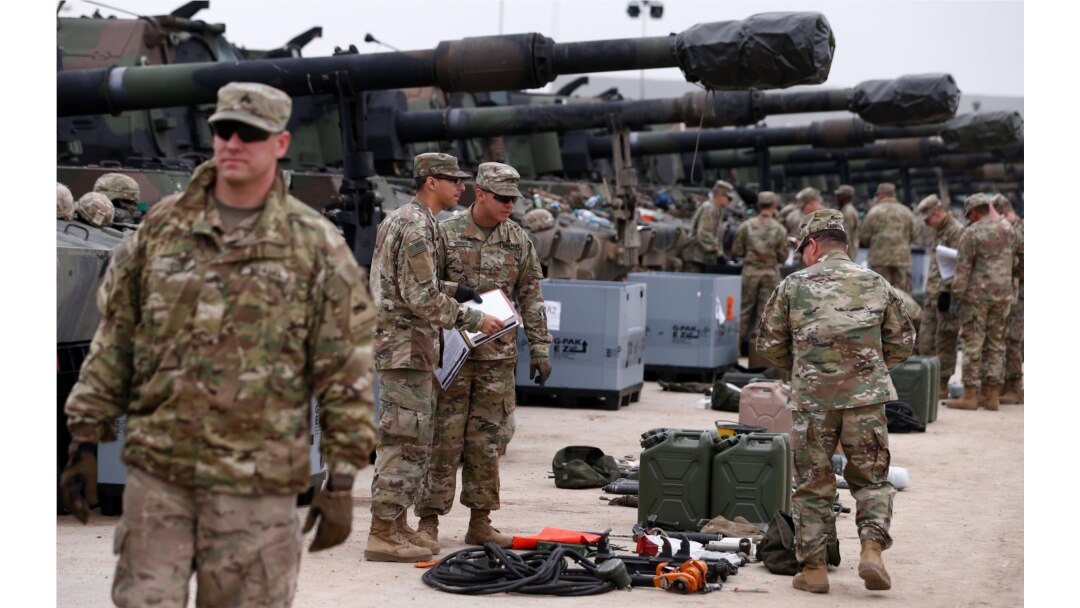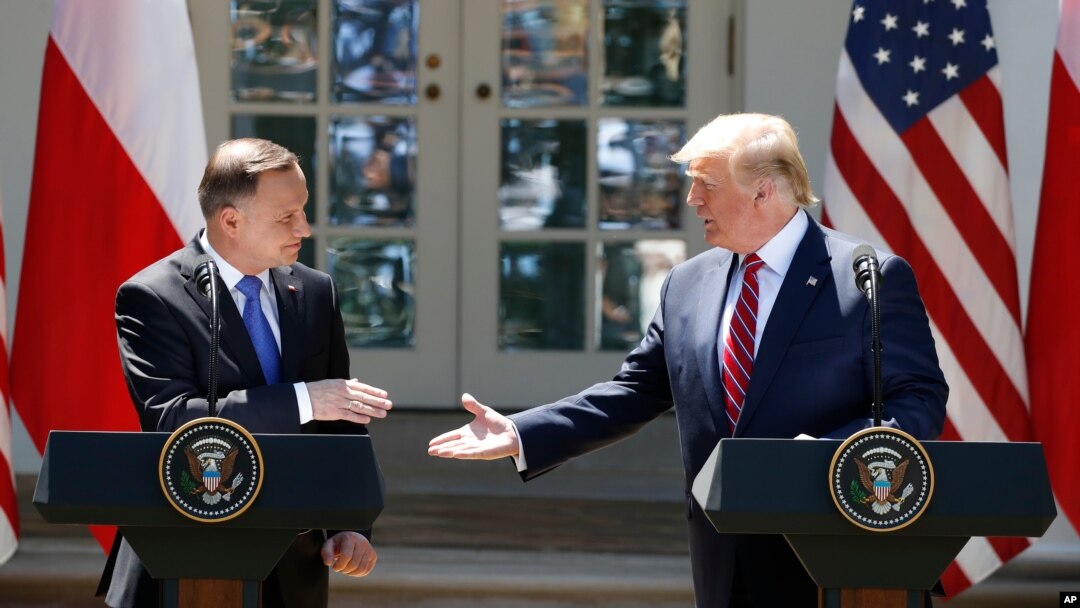The United States and Poland have signed a joint declaration affirming closer defense cooperation, which President Donald Trump says makes clear not only their strategic partnership “but deep common values, shared goals and a very strong and abiding friendship.”
Trump on Wednesday, alongside Polish President Andrzej Duda, announced 1,000 more U.S. service members will be sent to Poland.
Still unresolved is whether there will be a permanent placement of up to 2,000 additional American uniformed personnel in the country.
“We would be moving them from another location,” said Trump in the Oval Office, suggesting the troops would be shifted from Germany.
Trump ruled out boosting the overall number of American forces in Europe.
Later, during a joint news conference in the White House Rose Garden, Duda noted there are 4,500 American military personnel in his country on a rotational base, and he said the document signed Wednesday would clear the way for additional units, including special forces, as part of an “enduring presence.”
The two leaders avoided announcing a “permanent” shifting of more U.S. troops to Poland – a move likely to significantly increase tension with Russia.

U.S. troops check military equipment after their deployment to Drawsko Pomorskie, Poland, March 21, 2019.
“It’s always going to be up to the United States to decide how many troops are sent to Poland,” Duda explained.
Wednesday’s announcement of the 1,000 additional troops “is more symbolic than significant” since they will neither be combat troops nor will any forces be based in Poland permanently and “will not add major military capabilities against Russia,” says Hudson Institute Fellow Blaise Misztal.“Poland will see this as hopefully the beginning of greater, not the final state of, U.S.-Polish defense cooperation.”
Poland has pledged to contribute at least $2 billion to place additional U.S. forces and assets in the country to deter any possible Russian aggression.
Duda has previously suggested calling the facility to host them “Fort Trump,” in honor of the U.S. president. Other Polish officials say that is expected to be a symbolic, not official, name for the military facility.
“That’s all I need -- Fort Trump. You people would have a field day with that,” responded the U.S. president to a reporter’s question in the Oval Office about the facility, which Trump said would be “world class.”
Trump is hailing Poland’s decision to order from the United States “32 or 35 brand new F-35s at the highest level.”
Duda had an opportunity to visually inspect one of the planes on Wednesday – but at a distance as it was flown over the White House.
A F-35 Joint Strike Fighter aircraft performs a flyover above the White House in Washington, June 12, 2019.
Trump was also clearly impressed with the strike fighter’s capabilities.
“It actually came close to a halt as it came over the White House,” said the U.S. president.
Poland is among the seven NATO countries that have already hit their goal of 2% GDP spending on defense, a pledge that Trump has often criticized other NATO allies for not yet achieving. The pledge, signed in Wales in 2014, requires all NATO countries to reach this goal by 2024.
Trump has been wary both of labeling Russia as an adversary and of sending more U.S. forces abroad.
“Nevertheless, Poland has been able to convince him to acquiesce on both points,” according to Misztal. “Poland has successfully positioned itself as the administration’s best and closest European partner.”
Some members of the U.S. Congress have other concerns about Poland.
Thirteen House Democrats, in advance of Duda’s arrival, sent a letter to Trump asking the U.S. president to raise with his guest the state of democracy and human rights in Poland.
First lady Melania Trump, President Donald Trump, Polish President Andrzej Duda, and his wife Agata Kornhauser-Duda watch a flyover of a F-35 Lightning II jet at the White House, in Washington, June 12, 2019.
“While the United States and Poland will remain close allies – indeed, because we are the closest of friends – it is critical that you speak honestly with Polish leaders about the importance of standing up for democratic values,” the letter reads.
“I have growing concerns about the current government’s efforts to draw inward, curtailing critical democratic protections such as a free press, an independent judiciary, and a nonpartisan military,” says Congresswoman Marcy Kaptur, co-chair of the Congressional Poland Caucus and who is of Polish heritage. “Right-wing, nationalistic extremism is on the rise in Poland, as evidenced by troubling anti-Semitic rallies, inflammatory rhetoric, and anti-immigrant hate speech.”
Asked about the issue by reporters in the Oval Office, Trump replied: “I’m not concerned at all. They won’t backslide. They have to do well. We have to make sure they do well.”
Duda chimed in: “There are no problems with democracy in Poland. Everything is doing excellent.”
The Polish president began his six-day visit to the United States on Wednesday with the White House visit, his second such meeting here with Trump.
Duda also invited Trump to make a second visit to Poland this coming September to mark the 80th anniversary of Nazi Germany’s invasion of the country, which triggered World War II.
Trump responded that such a trip is under consideration.


